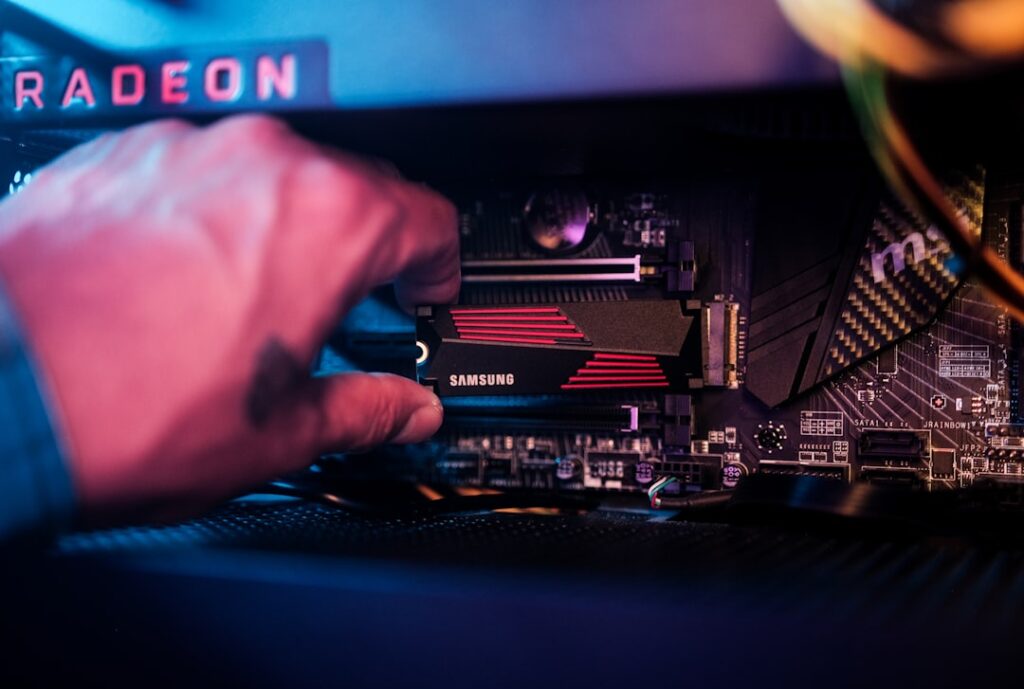Samsung, one of the leading technology companies in the world, has been at the forefront of developing and implementing artificial intelligence (AI) technology in its products and services. AI refers to the simulation of human intelligence in machines that are programmed to think and learn like humans. It has become increasingly important in the tech industry as it has the potential to revolutionize various sectors and improve user experiences.
Key Takeaways
- Samsung is heavily investing in AI technology for its products and services.
- AI is being used by Samsung to enhance user experience and improve product functionality.
- Samsung’s vision for the future includes a significant role for AI in its products and services.
- Samsung is investing heavily in AI research and development to stay ahead of the competition.
- Ethical considerations are being taken into account in the development of Samsung’s AI technology.
The impact of AI on Samsung’s products and services
Samsung has integrated AI into a wide range of its products and services, enhancing their functionality and user experience. For example, Samsung’s smartphones now come equipped with AI-powered virtual assistants like Bixby, which can perform tasks such as setting reminders, answering questions, and controlling smart home devices. Additionally, Samsung’s smart TVs use AI to analyze user preferences and provide personalized recommendations for content.
In terms of services, Samsung has developed AI-powered features for its digital assistant Bixby, such as Bixby Vision, which uses image recognition technology to provide information about objects in real-time. This feature can be used for tasks like translating text, identifying landmarks, and shopping for products online.
How Samsung is using AI to enhance user experience
Samsung’s integration of AI technology has greatly improved user experiences across its product lineup. For instance, AI algorithms are used in Samsung’s smartphones to optimize battery life by learning usage patterns and adjusting power consumption accordingly. This ensures that users can enjoy longer battery life without compromising on performance.
Furthermore, AI has made Samsung products more intuitive and user-friendly. For example, Samsung’s smart TVs use AI to automatically adjust picture settings based on the content being viewed, resulting in a more immersive viewing experience. Additionally, AI-powered voice recognition technology allows users to control their devices through natural language commands, making interactions with Samsung products more seamless and convenient.
The role of AI in Samsung’s vision for the future
| Metrics | Data |
|---|---|
| Investment in AI research and development | 22 billion by 2020 |
| Number of AI-powered devices shipped | 500 million by 2020 |
| AI-powered features in Samsung products | SmartThings, Bixby, Samsung Health, and more |
| AI partnerships and collaborations | Microsoft, IBM, and more |
| AI applications in Samsung’s vision for the future | Smart homes, autonomous vehicles, personalized healthcare, and more |
Samsung has a long-term vision for AI technology and sees it as a key driver of innovation and growth. The company aims to leverage AI to create a more connected and intelligent ecosystem of devices and services. This includes developing AI-powered technologies that can understand and anticipate user needs, enabling a more personalized and tailored experience.
In addition, Samsung is exploring the potential of AI in areas such as autonomous driving, robotics, and healthcare. The company believes that AI has the power to transform these industries and improve the quality of life for people around the world. By investing in AI research and development, Samsung is positioning itself as a leader in the AI space and is committed to shaping the future of technology.
Samsung’s investment in AI research and development
Samsung is investing heavily in AI research and development to stay at the forefront of technological advancements. The company has allocated significant resources to establish research centers dedicated to AI, both in South Korea and around the world. These centers focus on developing cutting-edge AI technologies and fostering collaboration with academia and industry partners.
The importance of investing in AI for Samsung’s future success cannot be overstated. As AI continues to evolve and become more integrated into various industries, companies that fail to invest in this technology risk falling behind their competitors. By investing in AI research and development, Samsung is ensuring that it remains at the forefront of innovation and can continue to deliver products and services that meet the evolving needs of consumers.
The ethical considerations of Samsung’s AI technology

While AI has the potential to bring about numerous benefits, it also raises ethical concerns that need to be addressed. For example, there are concerns about privacy and data security when it comes to collecting and analyzing large amounts of user data. Additionally, there are concerns about bias in AI algorithms, which can perpetuate existing inequalities or discriminate against certain groups.
Samsung recognizes these ethical considerations and is committed to addressing them. The company has implemented strict privacy and security measures to protect user data and ensure transparency in how data is collected and used. Samsung is also actively working to eliminate bias in AI algorithms by investing in research and development to improve the fairness and accuracy of its AI technologies.
Samsung’s AI-powered virtual assistant, Bixby
Bixby, Samsung’s AI-powered virtual assistant, has greatly improved user experiences across Samsung devices. Bixby can perform a wide range of tasks, from setting reminders and answering questions to controlling smart home devices. It uses natural language processing and machine learning algorithms to understand and respond to user commands.
Users have reported positive experiences with Bixby, noting its accuracy and responsiveness. For example, Bixby’s voice recognition technology allows users to control their devices through natural language commands, making interactions more intuitive and convenient. Additionally, Bixby’s integration with other Samsung services, such as Bixby Vision, provides users with a seamless and integrated experience.
The integration of AI in Samsung’s smart home ecosystem
AI has played a crucial role in making Samsung’s smart home products more efficient and user-friendly. For example, Samsung’s smart refrigerators use AI algorithms to learn user preferences and adjust temperature settings accordingly. This ensures that food stays fresh for longer and reduces energy consumption.
Furthermore, AI-powered voice assistants like Bixby allow users to control their smart home devices through natural language commands. This makes it easier for users to interact with their devices and create a more seamless and integrated smart home experience.
How Samsung’s AI is transforming healthcare and education
Samsung’s AI technology is not limited to consumer electronics but is also making significant strides in transforming industries such as healthcare and education. In healthcare, Samsung is developing AI-powered solutions that can analyze medical images, assist in diagnosis, and improve patient outcomes. For example, AI algorithms can analyze medical images such as X-rays or MRIs to detect abnormalities or assist in the diagnosis of diseases.
In education, Samsung is exploring the potential of AI to personalize learning experiences and improve educational outcomes. AI-powered tutoring systems can adapt to individual student needs and provide personalized feedback and guidance. This can help students learn at their own pace and address their specific learning needs.
The potential of Samsung’s AI technology to revolutionize industries beyond consumer electronics
Samsung’s AI technology has the potential to revolutionize industries beyond consumer electronics. For example, in the automotive industry, AI can be used to develop autonomous driving systems that enhance safety and efficiency on the roads. In the manufacturing industry, AI-powered robots can automate repetitive tasks and improve productivity.
Furthermore, AI can be used in industries such as finance, retail, and logistics to analyze large amounts of data and make more informed decisions. This can lead to improved customer experiences, increased operational efficiency, and better business outcomes.
Samsung’s AI technology has had a significant impact on various industries, including consumer electronics, healthcare, education, and more. By integrating AI into its products and services, Samsung has enhanced user experiences, made devices more intuitive and user-friendly, and paved the way for future innovations. With its continued investment in AI research and development, Samsung is well-positioned to shape the future of technology and revolutionize industries beyond consumer electronics.
If you’re interested in exploring the impact of AI on various industries, you might find this article on how television magazines and newspapers are being replaced by AI quite intriguing. It delves into the ways in which artificial intelligence is revolutionizing the media landscape, including the production and distribution of content. With Samsung being at the forefront of technological advancements, this article provides valuable insights into the future of media and how AI is reshaping it. Check it out here.
FAQs
What is Samsung?
Samsung is a South Korean multinational conglomerate that specializes in electronics, appliances, and other products.
What is AI?
AI stands for Artificial Intelligence, which refers to the simulation of human intelligence in machines that are programmed to think and learn like humans.
What is Samsung’s involvement with AI?
Samsung has been investing heavily in AI research and development, and has integrated AI technology into many of its products, including smartphones, TVs, and home appliances.
What are some examples of Samsung’s AI products?
Samsung’s AI products include Bixby, a virtual assistant for smartphones and home appliances; SmartThings, a platform for connecting and controlling smart home devices; and QLED TVs with AI upscaling technology.
How does Samsung use AI in its products?
Samsung uses AI in its products to enhance user experience, improve efficiency, and enable new features. For example, Bixby can recognize voice commands and perform tasks like setting reminders or controlling smart home devices.
What are some potential benefits of Samsung’s AI technology?
Samsung’s AI technology has the potential to improve productivity, enhance entertainment experiences, and make daily tasks easier and more efficient. It could also lead to new innovations and advancements in various industries.



